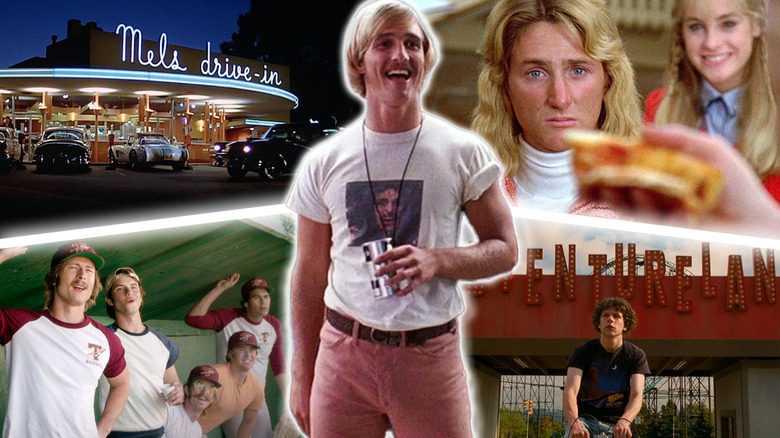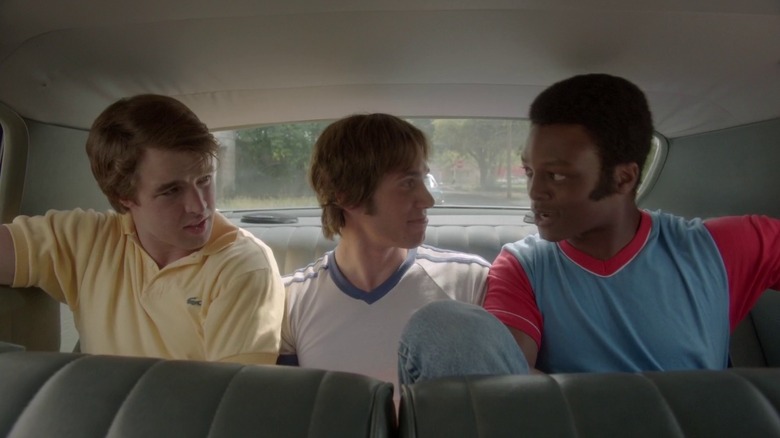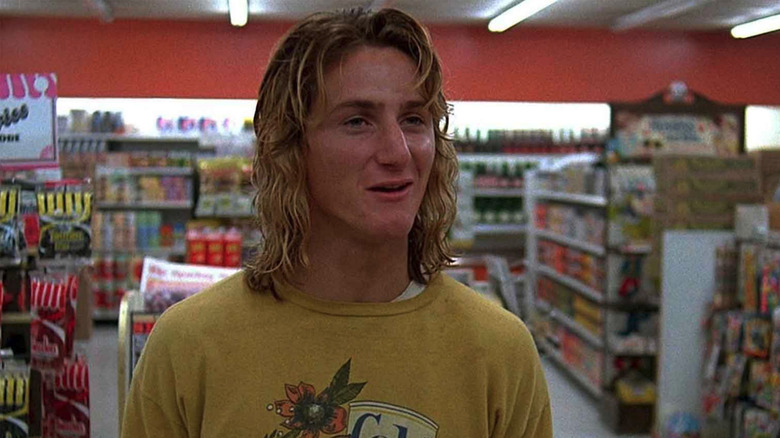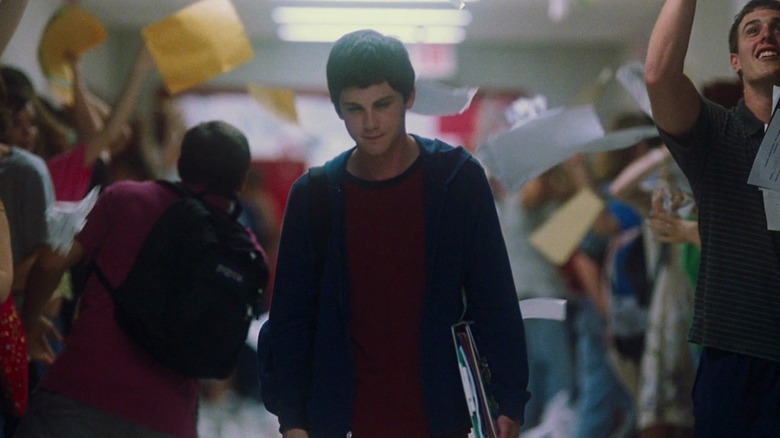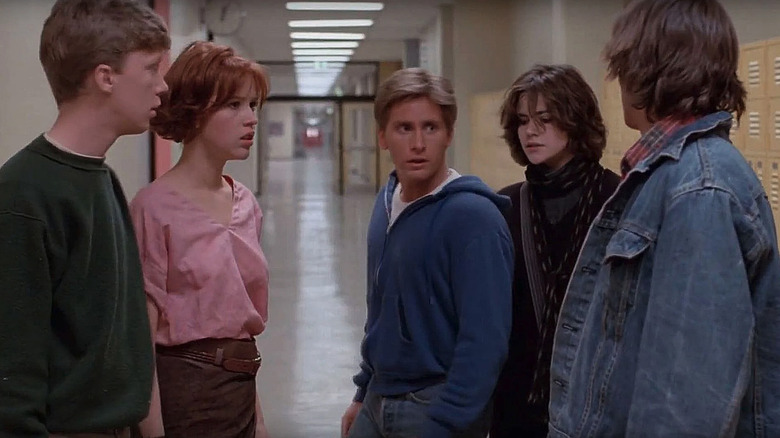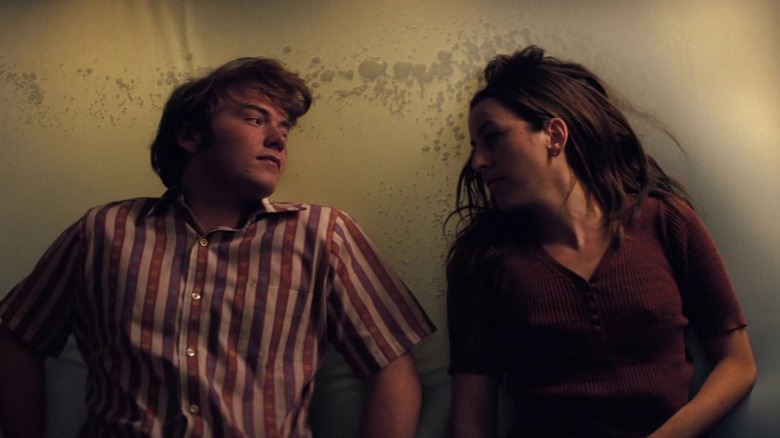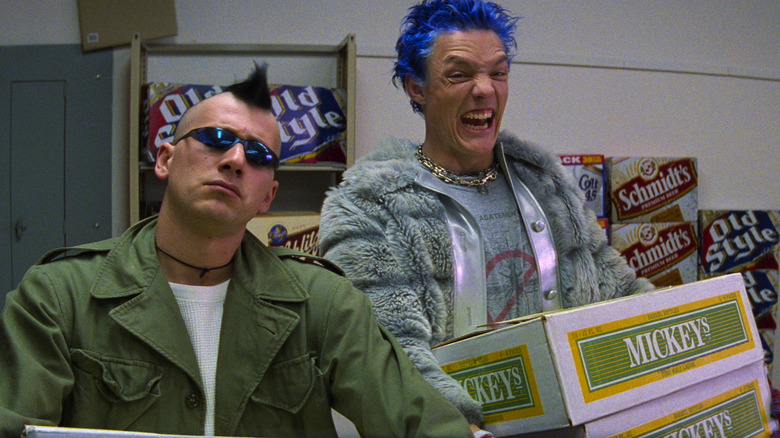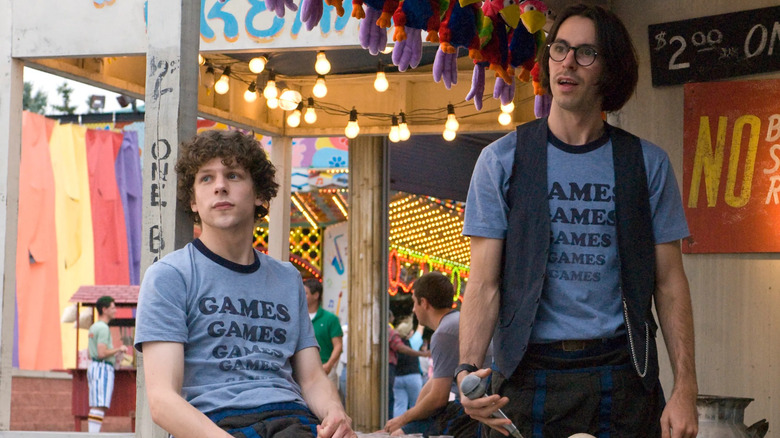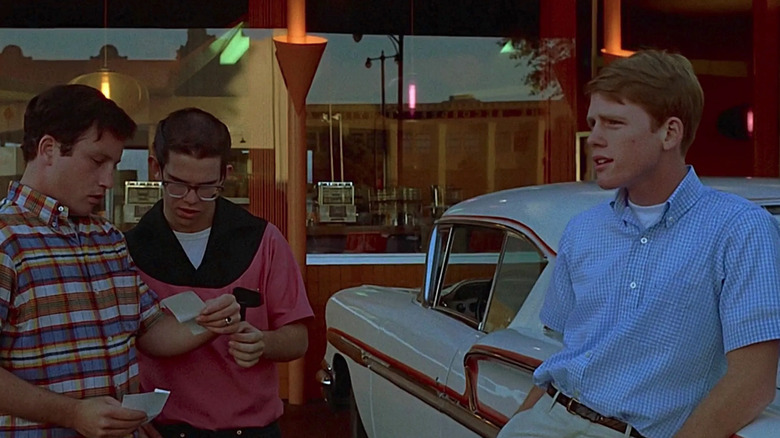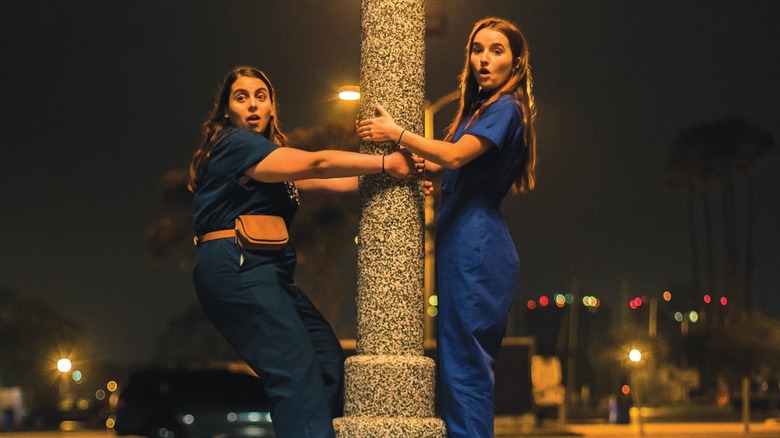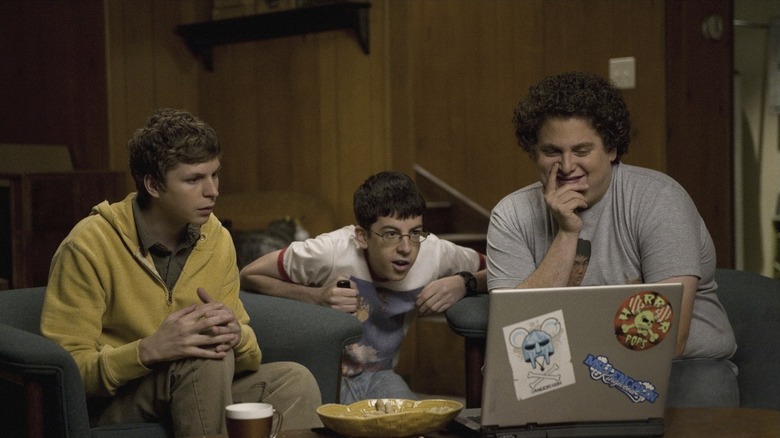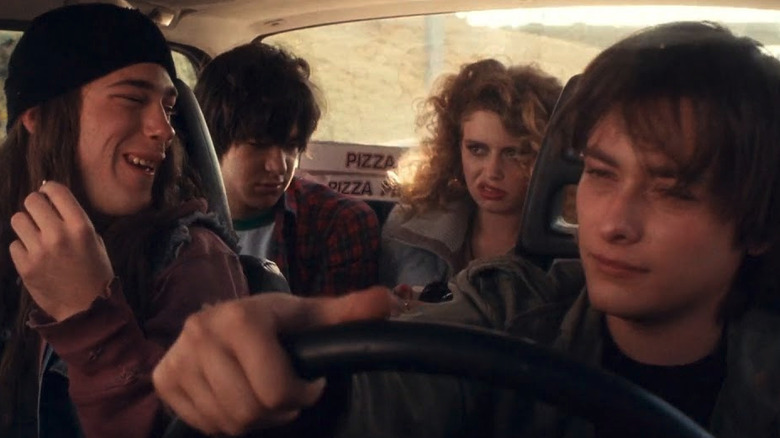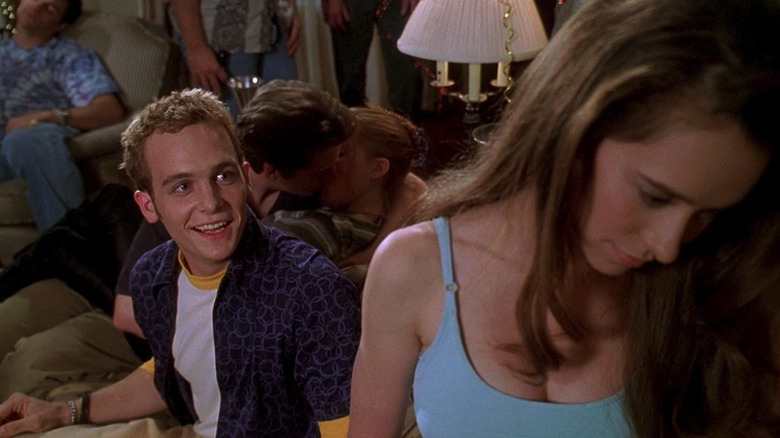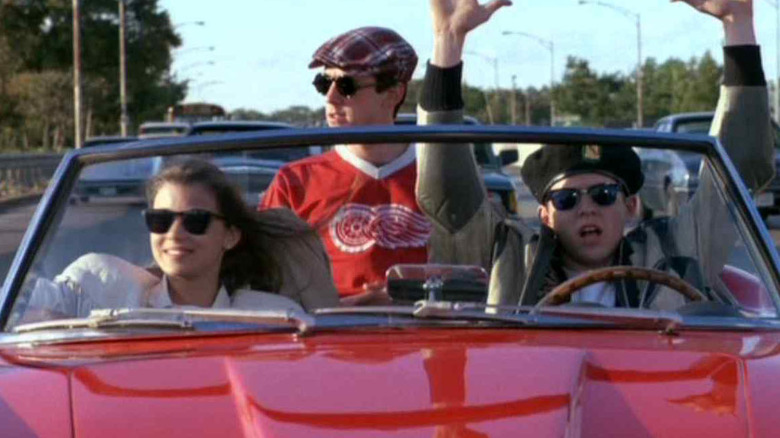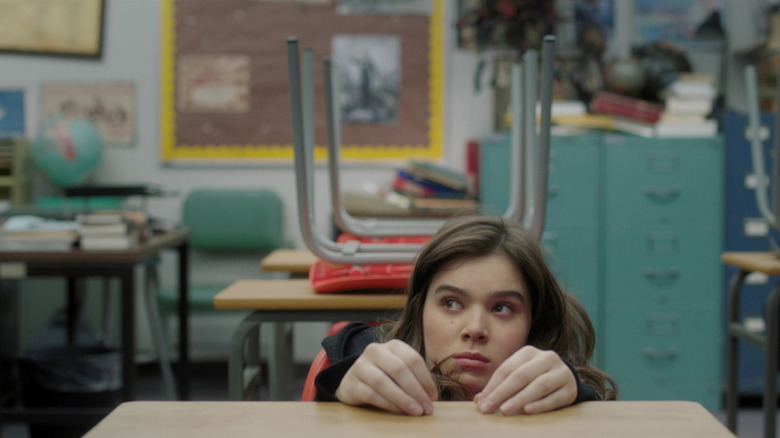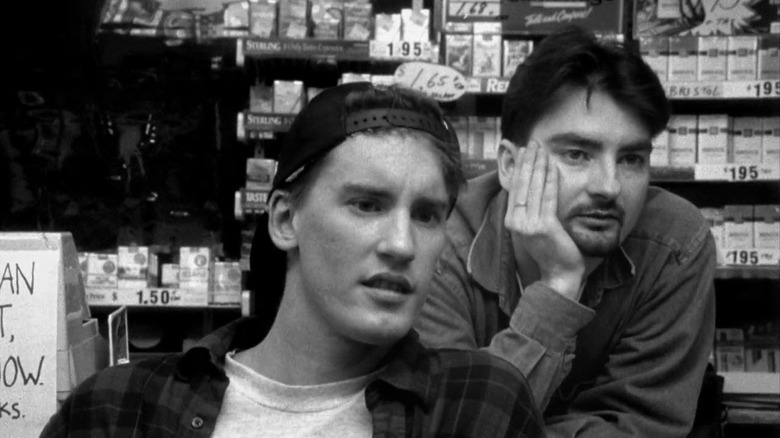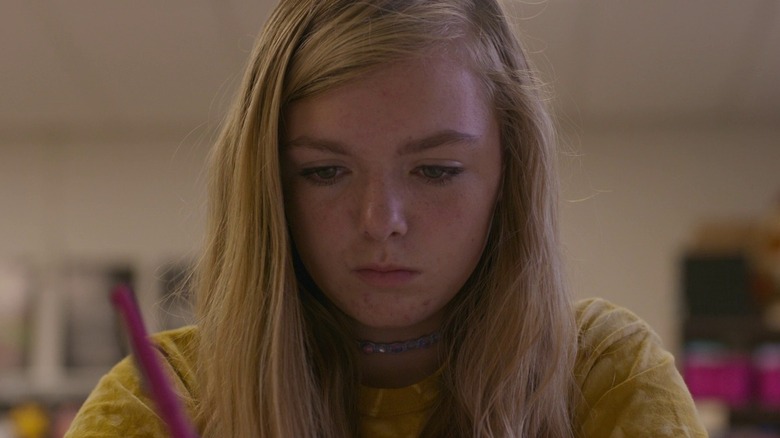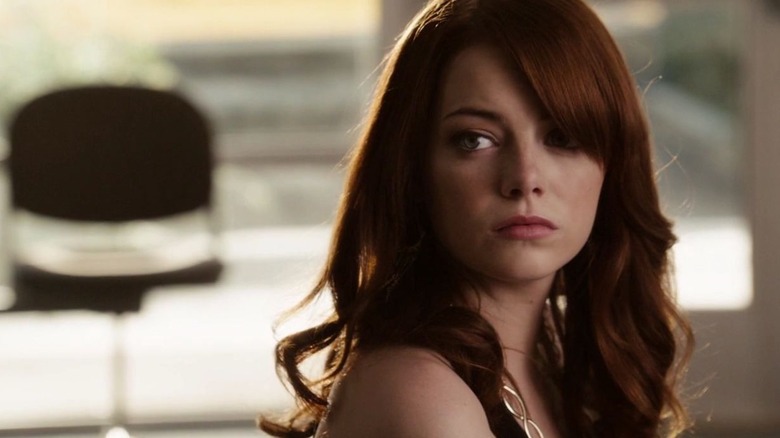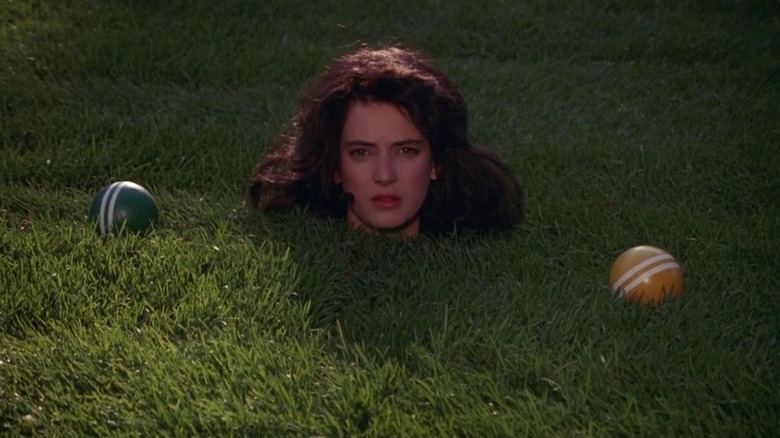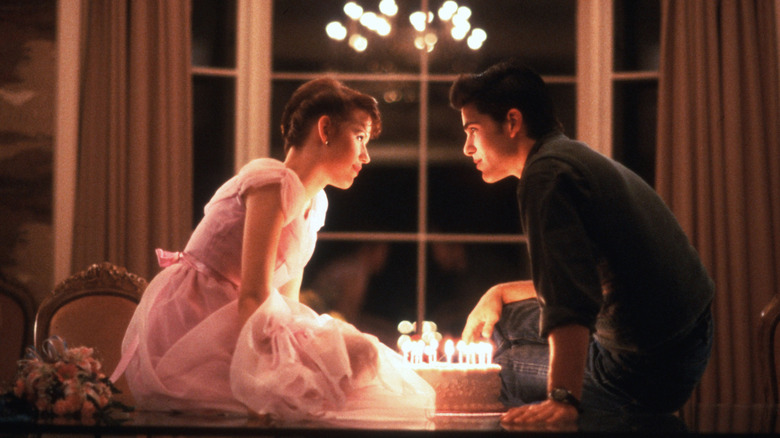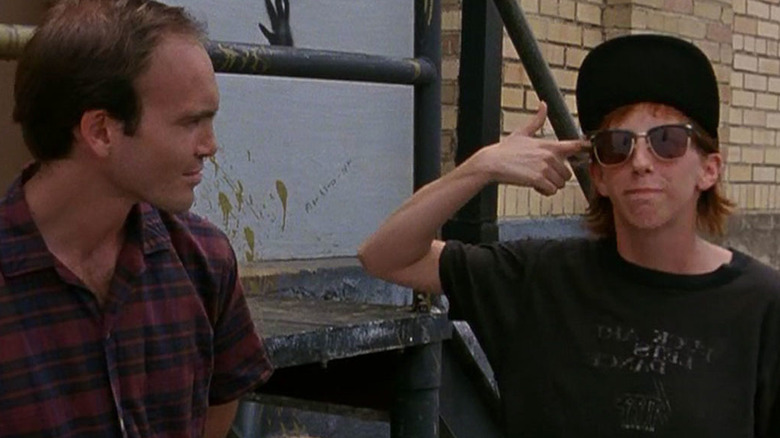20 Best Movies Like Dazed And Confused
We may receive a commission on purchases made from links.
You know what they say about "Dazed and Confused" after all these years: It's great, because no matter how old you get, everyone in it stays the same age. At least I think that's what they say. If not, then I don't condone it.
In any case, "Dazed and Confused" may have been a perfect cinematic calling card for indie champion Richard Linklater and early-career introductions to actors who would go on to become household names to this day, like Matthew McConaughey, Milla Jovovich, and Ben Affleck. But it also continues to hold up on its own merits as a breezy, slice-of-life nostaliga piece about the bittersweet wistfulness that accompanies coming of age.
"Dazed and Confused" didn't spearhead the formula, and some of the movies it's in direct conversation with can be found on this list. With Linklater drawing inspiration from his own life, however, he develops his own singular perspective to infuse into the teen movie genre, one that was perfect for the sudden wave of independent cinema receiving more attention during the surge of '90s independent films that would become cult classics on VHS. Even if everyone stays the same age, "Dazed and Confused" continues to develop new meanings the older you get.
Here are 20 of the best movies like "Dazed and Confused."
Everybody Wants Some!!
You can't do much better in looking for "Dazed and Confused" style movies than going for the self-professed spiritual sequel from Richard Linklater himself. "Everybody Wants Some!!" trades in high school for college and the '70s for the '80s, but it remains firmly rooted in Linklater's reliable, easygoing style of hangout repose.
A surprisingly overlooked entry within Linkater's ouvre, many people may remember "Everybody Wants Some!!" as the first time they recall seeing Glen Powell on screen. But he's joined by a roster of youthful character actors that help populate Linklakter's down-to-earth nostalgia and unhurried sense of observation, including the likes of Zoey Deutch and Wyatt Russell, all navigating the newfound troubles of hanging onto the edge of adolescence before being dropped into the pit of full-blown adulthood. "Everybody Wants Some!!" hasn't captured the same icon status that its sister film has, but that seems to have to do more with audience appetite rather than the quality of the film itself, which, on the contrary, is just as affecting as you would hope.
Fast Times at Ridgemont High
"Dazed and Confused" would have never happened without "Fast Times at Ridgemont High." For its beloved status, Amy Heckerling's high-school teen comedy may seem like a frivolous vestige of '80s coming-of-age fare, but its power comes from how much it refuses to treat the plight of teenagers as trivial fodder meant for pure jeering. Indeed, "Fast Times at Ridgemont High" kickstarted a trailblazing shake-up in studio filmmaking.
Working from a script by Cameron Crowe, Heckerling's film is a mainstay for its relatable and charming cast of characters — inhabited by 80s mainstays and early-career stars like Sean Penn, Judge Reinhold, Jennifer Jason Leigh, and more — but also for its progressive, forthright attitude toward sexuality and bodily autonomy, via a strikingly down-to-earth abortion subplot. "Fast Times at Ridgemont High" respects and understands its characters, which is why it served as the benchmark for quality teen movies heading into the future.
The Perks of Being a Wallflower
A coming-of-age movie that deals in much heavier thematic material, anyone who was old enough to be on Tumblr in 2012 should be no stranger to "The Perks of Being a Wallflower." Stephen Chbosky's film, working from his screenplay adapted from his own novel of the same name, may have been inadvertently custom-built for corny GIFs, but it's also a high school movie that acknowledges some brutal facets of reality, to the extent that the original "The Perks of Being a Wallflower" book is banned in some schools.
That's largely why "The Perks of Being a Wallflower" overcomes some of its more syrupy indie eccentricities to communicate hard truths about the unavoidable afflictions of life, from surviving sexual abuse, to teen suicide, to being castigated for your sexuality. Aided by sobering performances from Logan Lerman, Emma Watson, Ezra Miller, and an extended cast including Mae Whitman, Paul Rudd, and Nicholas Braun, "The Perks of Being a Wallflower" succeeds because of its unflinching understanding of the hardships of growing up.
The Breakfast Club
John Hughes is synonymous with the teen movie, and though many of his movies share the quality of not having aged very well, with antiquated understandings of social politics and outdated optics and language, they do speak to a certain time in American culture just as well now as they did contemporaneously. "The Breakfast Club" may be problematic, but there's no denying it as an essential building block of understanding the constitution of the psychological makeup of the American high-schooler.
Led by a now iconic ensemble of disparate teens that each fulfill an obligation in the adolescent hierarchical structure — Emilio Estevez, Judd Nelson, Molly Ringwald, Anthony Michael Hall, and Ally Sheedy — "The Breakfast Club" is built as a pressure cooker for conflicting teen movie cliches, which Hughes scrutinizes and picks apart with candor. "The Breakfast Club" ultimately still has a cinematic fantasy quality about it — certain elements convey wish fulfillment by ultimately leaning towards escapism — but "The Breakfast Club" helped define the '80s as the exemplary decade for teen movies that would aim to create something more affecting than your ordinary high school comedies.
Licorice Pizza
The most recent film on this list takes place three years before the time period of "Dazed and Confused." Paul Thomas Anderson takes us back to 1973 to spin his own yarn about the joy and confusion of growing up. Led by a revelatory performance from Alana Haim, "Licorice Pizza" sees one of our most fastidious contemporary directors loosen the reins for a coming-of-age movie that, despite its reliable hangout quality, is no less demandingly constructed.
The crux of "Licorice Pizza" is the jubilant but slightly uncomfortable relationship between Haim's Alana Kane and Gary Valentine (Cooper Hoffman), as their blossoming relationship sees them engaging in plucky escapades through the San Fernando Valley. Anderson captures a beautiful, evocative romanticism and realism through his images, supported by reliably wondrous Jonny Greenwood score and a sprawling ensemble that affords "Licorice Pizza" a bevy of memorable characters littered throughout: Sean Penn, Tom Waits, Bradley Cooper, Benny Safdie, Skyler Giosondo, and more all contribute to the freewheeling texture that defines Anderson's film, excavating memories of being lost and dumb and carefree in the snarl of summer in the city.
SLC Punk!
If you consider yourself a bit of a renegade and think all these other slice-of-life coming-of-age movies are a little too straight-laced and conformist, man, then maybe you'll be best suited for "SLC Punk!" Writer/director James Merendino's semi-autobiographical film is led by Matthew Lillard and Michael A. Goorjian as two misfit punks wandering through early adulthood in the conservative rigidity and stagnation of Salt Lake City, where the two feel woefully marooned and out of place.
Tapped into an honesty regarding rebel culture and how that collides with a world that does everything it can to mold you into congruity, Merendino's film is a solid outing for a director who understands the essence of the punk scene and the power of allowing lives to simply play out on screen in all their day-to-day melodrama. It's also a righteous actor's showcase for its two stars, who inhabit their characters with both posturing and endearing, buried melancholy. More than anything else, "SLC Punk!" shows that it's possible to grow up without selling out.
Adventureland
One of the more neglected films on this list, "Adventureland" taps into a certain authenticity of the period-piece coming-of-age teen romance drama that others fall just short of. "Superbad" and "The Daytrippers" director Greg Mottola directs his own script, which follows a neurotic recent college grad named James Brennan (Jesse Eisenberg) whose dreams of a summer European excursion are dashed as his family runs into money trouble. Instead, he'll be getting a summer job at Adventureland, the local dilapidated theme park.
It's here he meets Em (Kristen Stewart), as well as a slew of other park-working eccentrics, falling into a new, found-family of friends and stumbling into a tricky little romance at the same time. Much of "Adventureland" is sold on its sincere tone, which doesn't sacrifice the quotidian malaise of its characters' lives to enliven its more comedic aspects. Instead, "Adventureland" finds its humor in those disappointing doldrums of life, and is a foundation for two superb lead performances, especially from Stewart, whose turn here is a career-best.
American Graffiti
Before George Lucas could secure funding and studio support for his ambitious sci-fi space opera (called "Star Wars," for those wondering), he first had to prove he was a commercially viable director. To do that, he made "American Graffiti," a loving tribute to Lucas' own formative coming-of-age years during the early '60s, which saw him and other young adults maturing during a time of critical cultural change in America.
Placed right at the cusp of the social upheavals that were about to define an entire generation of American society and politics, "American Graffiti" is happy to adopt an idealized view of the country. Lucas documents a sincere reflection on what it was like growing up in the post-World War II boom era, in which, despite Red Scare paranoia gripping the country, a growing middle class and newfound economic prosperity were beginning to fracture by the film's release in 1973. It is also an early showcase for Lucas as a consummate visual stylist and storyteller, a natural-born filmmaker with a gift for character detail and cinematic verve.
Booksmart
Olivia Wilde's directorial debut, "Booksmart," made waves when it landed in theaters back in 2019, lauded for its shrewd sense of wit and refreshing feminist perspective. In making a woman's answer to the likes of "Superbad," Wilde successfully crafts a genuinely funny and astute teen comedy, with a gender switch-up that acts as a great launching pad for two exceedingly funny performances from Kaityn Dever and Beanie Feldstein.
Moreover, many great coming-of-age movies are valuable representations of the era in which they were released, and though "Booksmart" idealizes some regressive forms of corporate institutional liberalism, it also serves as a reaction to the broader sense of discernible reactionary right-wing politics that had become evident in America during Trump's first term in office. Making a comedy about two young girls coming to their own uninhibited self-actualization in a time of starkly regressive politics makes for something that feels uplifting for young women having to grow up surrounded by a world that suddenly felt much more socially hostile, and even just for that reason alone, "Booksmart" is a success.
Superbad
We talked about "Booksmart," but you really don't get to that movie without "Superbad." The second Greg Mottola-directed movie on the list after "Adventureland," "Superbad" helped to define the high school movie for a certain generation coming of age at the tail end of the Bush era. "Superbad" had a newfound raunchiness and naturalism about it to match the rising fad of more authentic and observational Judd Apatow-produced or styled studio comedies.
It was a perfect fit for a growing inclination toward crass comedies that maintained a certain empathy and relatability, which is why "Superbad" went on to substantial box office success. It felt like a radical comedy to see in theaters, back in a time when audiences would still head out to the cinema to try their luck on the type of film that now often gets relegated to streaming. With its central story about two codependent high school misfits (played in breakout performances by Michael Cera and Jonah Hill) who have to learn to accept the crushing reality of moving on after the safety net of high school, "Superbad" taps into a universal feeling of what it's like to feel the harsh embrace of the world on the precipice of adulthood.
Detroit Rock City
Adam Rifkin's 1999 feature "Detroit Rock City" is a 1978-set period piece following a group of young KISS superfans desperately trying to obtain tickets to the sold-out Detroit show for the world-famous glam/hard-rock band. "Detroit Rock City" stands out from other coming-of-age narratives for its embrace of the anarchic and subversive, prioritizing being a riotous comedy above all else and otherwise eschewing conventional expectations.
Along with its rowdy temperament, the film is an excellent showcase for its backlog of prime '90s and other early-career character actors, featuring stars like Giuseppe Andrews, Edward Furlong, Shannon Tweed, Natasha Lyonne, Lin Shaye, Melanie Lynskey, and more. Produced by Gene Simmons himself, "Detroit Rock City" is a great movie because it's a blast to watch even without being a KISS fan — it's so unbridled and engages in teen movie chaos with such abandon that anybody can relate to the core dynamics of this hyper-specific friend group.
Can't Hardly Wait
Here's another late-90s-released teen flick, full of your prerequisite rising names at the time. "Can't Hardly Wait" sticks together folks like Jennifer Love Hewitt, Ethan Embry, and Seth Green at a high-school party, where obligatory high school dynamics are left to play out. The outcast Embry is out to woo the pretty and popular Hewitt; Charlie Korsmo plays a mistreated geek out for revenge against his bully, played by Peter Facinelli; Green sparrs with the caustic Lauren Ambrose.
"Can't Hardly Wait" doesn't do much to subvert any of the expected formula, but it is a dependable piece of adolescent comedy evocative of its era, featuring the inclusion of multiple Smash Mouth needledrops — as well as Eve 6, Busta Rhymes, and more — which firmly date it to 1998. But there's a buried sensitivity within the characters on display as well, and there's some real charm emitting from these young stars, depicting their characters with earnestness and a rapport that's easy to latch onto.
Ferris Bueller's Day Off
"Ferris Bueller's Day Off" is probably the John Hughes movie that retains the most of the initial amount of charm it conveyed upon release, even if you're much more likely to want to brutally psychoanalyze Ferris (Matthew Broderick) and his insane, selfish actions against his friends. There is something inherent to the text of the movie about Ferris behaving like an ass that gives "Ferris Bueller's Day Off" a sort of barbed texture that subverts its high school-movie familiarity.
It also has a breezy, off-the-cuff quality, perhaps residual of the fact that Hughes ended up writing the script in just two days. As Bueller directly engages the audience in adolescent philosophizing about living life to the fullest, and as he inveigles his friends to his own ends of sauntering around town all day validating his disdain for academics, "Ferris Bueller's Day Off" combines the earnest slice-of-life movie and, unexpectedly, the biting nature of an unforgiving character study.
The Edge of Seventeen
"Edge of Seventeen" wasn't the breakout role for Hailee Steinfeld — that would actually be Joel and Ethan Coen's adaptation of "True Grit" — but it was the one that reaffirmed her as a true noteworthy young talent, able to carry the existential weight of the Coens and the emotional melodrama of coming-of-age alike. Even then, writer-director Kelly Fremon Craig's 2016 film avoids the regular truisms of the genre, and opts for something that feels much more candid and truthful.
Steinfeld plays Nadine Franklin, a high school misfit (and one of her best roles) still reeling from the death of her father and struggling to reconcile her place in her town, her school, and within her own family. Things are exacerbated when her best friend Krista (the great Haley Lu Richardson) ends up sleeping with Nadine's popular older brother Darian (Blake Jenner). Nadine is left to her own devices to navigate the tumultuous terrain of her dejected suburban life, partially defined by her dynamic with Woody Harrelson, in a standout performance as her teacher Mr. Bruner, who provides disaffected life advice sourced from his own cynicism. "The Edge of Seventeen" pays homage to its Hughes-like predecessors while refusing to stifle its own defining voice.
Clerks
Something of an anomaly on this list is "Clerks," given its markedly different milieu and characters,a lousy convenience store and its bored daytime workers. There are no endearing teens learning life lessons in "Clerks," just malcontent cashiers stuck behind a counter talking about "Star Wars" and sex all day, which was far more relatable for a certain age group in 1994. Kevin Smith's slice-of-life comedy was revolutionary when it was released in the midst of the '90s film boom because of its observational approach and non-story of two textbook-of-their-era slackers stuck in a dead-end job.
Somehow spawning a trilogy and extended film universe, "Clerks" was never destined to be as successful as it was, having been made independently on a shoestring budget on location in the convenience store where Smith had actually once held a job. The trademark Smith dialogue of extensive pop culture and crude sex-focused back-and-forth is going to be hit or miss nowadays, and there are outdated elements of "Clerks" residual from a different time. But it remains a landmark of DIY filmmaking, and is bound to speak to anyone who's had to work any sort of debasing retail job.
Eighth Grade
Stepping off the stand-up stage and getting behind the camera to direct his first feature, Bo Burnham's "Eighth Grade" was somewhat unexpected at the time, but it now more cleanly slots into the greater collection of Burnham's work, which is frequently focused on the uncomfortable realities of being alive today. Kickstarting the career of Elsie Fisher as Kayla Day, "Eighth Grade" follows her during her hopelessly awkward self during the last week of middle school, right on the precipice of real teenage adolescent growth.
"Eighth Grade" sets itself apart from other coming-of-age fare because of its emphasis on the way digital technology has compounded the uncomfortable reality of being a kid, which Burnham talks about directly in this regularly circulated interview clip, speaking about the attention economy in the age of social media. "Eighth Grade" has some expected debut-feature defects, but it's a pitch-perfect representation of an experience that has only continued to worsen: growing up attached to a smartphone.
Easy A
Satisfying the familiar filmmaking trope of loosely adapting classic literature into contemporary coming-of-age fare, "Easy A" refits Nathaniel Hawthorne's "The Scarlet Letter" into a modern high school setting while simultaneously paying tribute to the teen comedies of the '80s and '90s. With a script by Bert V. Royal, the Will Gluck-directed film synthesizes all of its influences into something that stands on its own as a charming and funny piece of studio comedy fare.
Emma Stone's initial introduction to most general audiences, though she had previously supported in movies like "Superbad," "Easy A" also sports a great supporting comedic cast featuring Amanda Bynes, Thomas Hayden Church, Lisa Kudrow, Malcolm McDowell, Stanley Tucci, and Fred Armisen, all throwing their weight behind a teen sex comedy that wrestles with the same themes of the book it's modifying regarding societal judgement when it comes to perceptions of promiscuity and sex. Cleverly written and well-cast, "Easy A" broke through as a hit for the teen crowd in 2010 by encapsulating classic thematic material while appealing to a newly evolving general audience.
Heathers
Probably the movie with the darkest sense of humor on this list, "Heathers" is a cult classic for folks who like their teen movies with a bit of a weird, biting edge. Winona Ryder leads as a girl desperate for acceptance at her school, and who ends up in a twisted romance with a young outcast played by Christian Slater, who has the perfect plan: simply kill the popular girls.
Though "Heathers" was briefly revived as a misbegotten TV series, the film endures because of its hyper-cultural specificity, and how watching it so evokes a certain identity of black humor expressing the afflictions of the high school experience at the tail end of the '80s. To that end, "Heathers" envisions high school as a powder keg of sociopathy and potential energy, ready to explode into the chaos of surrealistic murder and dream sequences. "Heathers" recognizes the horrors of high school, but it also thinks they're kind of sadistically funny.
Sixteen Candles
One last entry from the many relevant John Hughes pictures to leave you with on this list. "Sixteen Candles" stays true to form as an '80s comedy and a Hughes movie: often genuinely charming, and with plenty of outdated problematic elements to feel uncomfortable with while watching. In particular, "Sixteen Candles" competes with "Breakfast at Tiffany's" in having the most offensive Asian character ever put to screen, as Gedde Watanabe's Long Duk Dong remains an egregiously racist caricature.
That's not to discount the many ways "Sixteen Candles" succeeds as a quintessential '80s movie, led by Molly Ringwald, who's left feeling adrift in the days leading up to her 16th birthday, while pining after a popular jock and fending off the advances of her geeky peer. Though peppered with schmaltz and some strained moments of sentiment, the extended cast of game performers helps give the world of "Sixteen Candles" a little more true-to-life detail than Hughes's script may have initially afforded, making for an easygoing, approachable piece of teen movie nostalgia.
Slacker
If "Everybody Wants Some!!" is the spiritual sequel of "Dazed and Confused," then it may be reasonable to consider "Slacker" as something of a formal predecessor. Then again, this DIY breakthrough from Richard Linklater really just establishes the recognizable authorial voice of a director who enjoys letting his characters live their lives without intruding on their experiences.
That's pretty much how "Slacker" operates, passing the narrative baton from person to person through the streets of Austin, Texas, at the turn of 1990, back when the city could still reasonably claim some semblance of its "weird" identity. To that end, for anyone that can remember this version of Austin, "Slacker" is a bittersweet time capsule of a bygone period of a societal culture defined by artistry and eccentricity, where gentrification and corporatization had yet to take their toll. It's also a marvelous calling card for one of our most finest independent directors and diarist of the everyday human experience.
